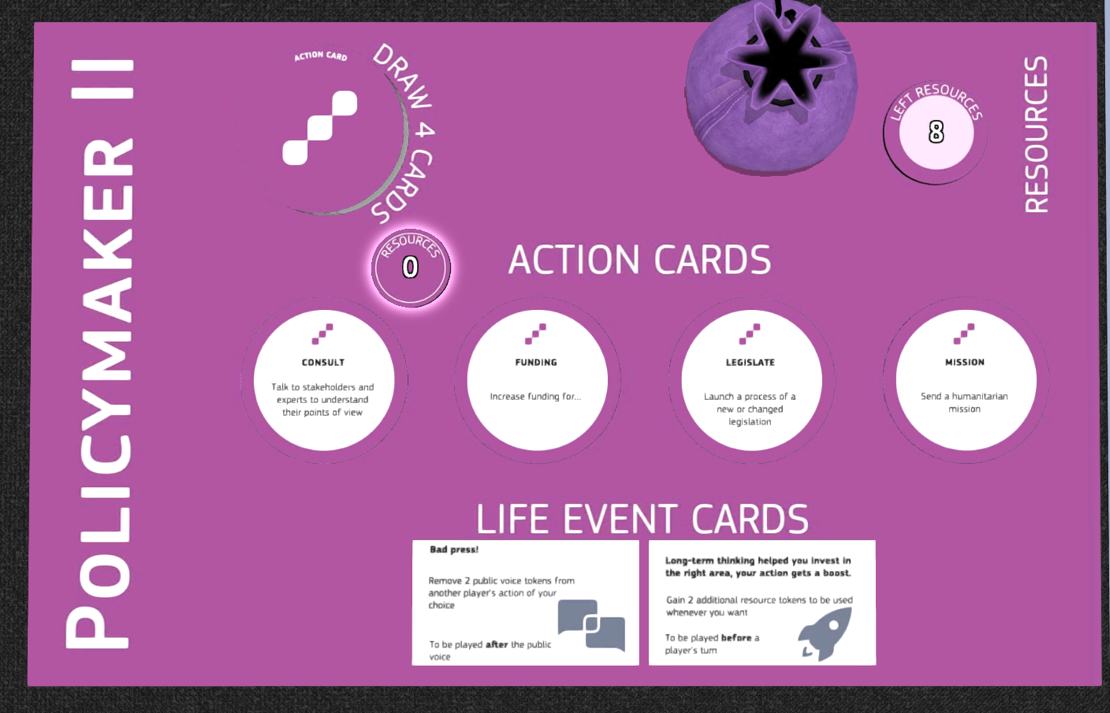Since 2020, DesignLab has joined the European project 'Responsible Research and Innovation Ecosystems at Regional Scale for Intelligent Cities, Transport and Energy' (RRI2SCALE), alongside the University of Twente and the province of Overijssel.
From 2020 to 2023, the project partners will design an approach to enable regions to make their research and innovation policies inclusive and future-proof, including workshops that DesignLab will lead in each of the regions participating. Apart from Overijssel, the European regions Galicia, Crete and the Norwegian Vestland also participate.
The Scenario Exploration System (SES) was designed by the EU Policy Lab with the goal to help participants, in less than three hours, take on different roles and try to explore different possible futures related to a certain topic. The approach can be adapted and applied to different policy fields and contexts.
Since its creation in 2015, the SES has been globally used by more than 2000 participants and there are more than 12 editions that have been developed.
In Autumn 2021, workshops will be held in each of the participating regions on future scenarios and regional innovation agendas. In this context the Scenario Exploration System (SES) will be used. Our team of DreamTeamers was tasked to adapt the system for the global pandemic situation. As the whole world goes online, we saw the need to digitalise the Scenario Exploration System so that this solution-oriented approach can remain in use in the RRI2SCALE project and be beneficial to many people now, more than ever.
What we did so far
We have digitised the Scenario Exploration System - The future of migration in the EU and beyond, since we didn’t have a set of scenarios available to us at the time. We used an online platform for playing & creating virtual tabletop games, called Tabletopia. It is a web browser-based service, so everyone with Internet access can play, as it is recommended to have a device with a bigger screen at hand for better experience.
Bringing a board game online is not a novel concept. For years board and role-playing game enthusiasts have built numerous platforms that offer different tools catering to different games. Indeed, we have experienced this firsthand in our personal lives. When the pandemic hit several games we used to play on campus in the Fanaat board game association in UTwente had to move online.
With this experience in mind, we reviewed the existing versions of the system and the available materials. Thankfully since the system is free and open source, enough material were available for us to make a few observations:
- The SES is a collection of mechanics and concepts that can be applied in any future exploration scenario
- Each version of the system is heavily dependent on the scenarios/theme used.
- The main technical necessities for the system are a board, a few decks of cards, dice and a video/audio call.

Furthermore, to improve the experience for the participants we have created a short explanatory video for the SES game and how to play it online. The resulting digitised version of the SES is still in its prototype phase. Our aim is to test it and improve upon the feedback from the testing sessions we are currently conducting.
To compliment the digital version of the system we needed to introduce a few more components such as Player areas, adjustable tokens, and also some adjustments to the board itself were needed in order to provide a smooth experience.
To improve the experience for the participants we have created a short explanatory video for the Scenario Exploration System and how to play it online.
Challenges and Solutions
It quickly became apparent that it would be challenging to transfer a system we never played to a new medium. Unfortunately, there was no possibility for us to play any version of the system, with an experienced facilitator. We opted to run a session for ourselves, effectively becoming our own initial test subjects. We therefore developed our own style and flow that we are now testing and refining. Later in the process we had the opportunity to participate in a taster session, offered by ABIS, that allowed us a view on how other people run scenario exploration sessions using SES, which proved very useful.
Running our first tests turned out to be quite challenging as well. To run a full session we would need a 3h slot in the agendas of 6 different people, twice. Which is a challenge by itself. We tackled this development by halving the time of the test to 1h30’, frontloading a lot of the preparation before the session and making sure that our team members could step in and take the roles of people who could not make it.
Our initial choice of telecommunications platform was Discord since it is the default platform used in Tabletopia. However, during the first test it became obvious that we needed to consider that not all participants will be familiar with the same video/voice/chat applications, which is essential for the session. Depending on the participants background, organization and even geographical location, different communication platforms might be preferred. To account for these differences, we allowed the communication to happen wherever the participants preferred.
Another challenge that we faced was due to the fact that Tabletopia requires the users to have a moderately good machine and stable internet connection. On top of creating a technical requirement list for our participants we also resized the elements which lowered the image quality and brought to light the need to re-design the elements and optimize them for the new medium.
We are now entering the next phase of the digitisation process where we will be building the final, custom version of the system, to be used in the RRI2SCALE workshops in Autumn 2021.
We will keep you updated!





